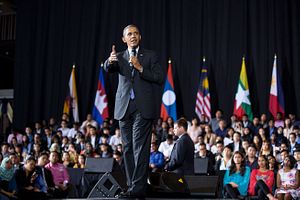Like the Flash, he came and went in the blink of an eye. U.S. President Barack Obama’s long awaited visit to Malaysia has concluded. Though the stint was speedy, it was not without significance. Obama shed particular light on Malaysia’s substantial young adult population, while largely avoiding issues of contention.
“There are a lot of people I don’t meet with, and opposition leaders I don’t meet with,” Obama said, referring to Malaysian opposition leader, Anwar Ibrahim.
Instead, the president visited tech firms, attempted to iron out Trans-Pacific Partnership arrangements (and faced some new issues involving big tobacco), and addressed youth entrepreneurs in a town hall Q&A. This last wasn’t meant to be just fluff; it was rather a concerted effort to make young Asians the centerpiece of the stopover.
During his speech at the University of Malaya last Sunday afternoon, Obama pointed out that “almost two-thirds of the population in [Southeast Asia] is under 35 years old.” Meaning Malaysia is on the cusp of change: change in politics, change in economics, change in society.
As of 2013, 17 percent of Malaysia’s population was between the ages of 15-24. This segment of the population grew up in the wake of Prime Minister Mahathir Mohamad’s rapid accumulation of Malay-centric executive privilege and has been witness to Najib Razak’s timid political reforms. Malaysians are ready for change.
The U.S. leader plainly stated what young Malaysian’s must consider as they mature and start influencing all corners of society. “Malaysia won’t succeed if non-Muslims don’t have opportunity.” For all Malaysians listening, this may well have been the most significant statement in the entire speech.
Without going into too much painful detail, it should be understood that ethnic dissension is the most significant and surmountable obstacle to Malaysian modernization efforts today. The ethnic makeup is roughly 50 percent Malay, 23 percent Chinese, 11 percent indigenous, 7 percent Indian, and 8 percent other. Malays held the short end of the stick during British rule, but after independence they have doggedly held onto power while dismissing criticism from minority groups. Razak’s political party, the United Malays National Organization, has won 13 general elections since 1957, making it the longest continually ruling party in the world. The U.S. has a rare opportunity to help this nascent democracy break its corrupt chains.
Obama’s decisive call for equal rights for non-Malay Muslims could well have a positive influence on the next generation of Malaysians. There is no doubt that the U.S. leader is widely admired across much of the international community, but Malaysian youth seem particularly fond of the president, a sentiment that could have the power to unite ethnic groups. Consider some of the questions that were asked:
Q: “What does happiness mean for you?”
Q: “What are the things you regret?”
Q: “What do you wish your legacy to be?”
Q: “What was your dream when you were [young]?”
Young Malaysians aren’t curious about how the president runs the most powerful army in the world or deals with economic crises. They see in Obama a role model, someone whose values they might emulate. One of which the president made loud and clear: respect each other regardless of ethnic differences.
Karam Singh Sethi spent 2013 teaching English in rural Malaysia on a Fulbright Scholarship and is now a freelance journalist in Washington D.C.
































